We are moving to a new subscription system. To receive future editions of Biosecurity Matters, you will need to resubscribe in the new system if you haven't already.

To unsubscribe from Biosecurity Matters, do nothing. After 15 November 2019 all existing contact data in the old system will be deleted. You will no longer receive emails from us after this date.
You can also unsubscribe at any time by clicking the unsubscribe link in our emails.
We have recently reviewed our privacy and security settings. Read our updated Privacy Policy.
Biosecurity is the management of the risk of pests and diseases entering, emerging, establishing or spreading in Australia and causing harm to animals, plants or human health, the economy, the environment and the community.
Entry denied: first visa cancellation under new biosecurity laws

To avoid heavy penalties, check what you can bring into Australia and if in doubt always declare it on your Incoming Passenger Card. Photo credit: Michael Masters
For the first time ever, a visitor to Australia has had their visa cancelled for breaching our biosecurity laws.
The passenger arrived at Sydney International Airport from Vietnam with a bag full of undeclared food. Their luggage included a whopping 4.5 kilos of pork, as well as garlic, fruit, raw eggs and over a kilo each of squid and quail.
Commonwealth officials used new legislation to cancel the passenger’s visa due to the significant biosecurity risk posed by the contents of their baggage, and the disregard they showed for the strict rules about declaring what you have.
The passenger is now unlikely to be able to come back to Australia for three years.
Head of compliance Peta Lane said that the verdict may seem harsh but it’s necessary to protect Australia’s agriculture and environment.
Continue reading about entry denied: first visa cancellation under new biosecurity laws
‘Australia’s $60 billion agriculture industry is as strong as it is because of our world-class biosecurity laws,’ Ms Lane said.
‘The pork in this passenger’s luggage alone could be a vector for African swine fever, a disease that is wreaking havoc in the pig livestock industry across the world.
‘Any of the other items could also pose a threat to our agricultural sector and the thousands of jobs those industries provide.’
Visitor visa cancellation is one of a range of measures now in place to strengthen Australia’s biosecurity at airports.
In response to the spread of African swine fever, heightened screening for banned imported pork products has been implemented at the border.
A stronger approach to enforcement is also in place to ensure the issuing of infringement notices reflects the seriousness of the breach.
‘It’s not just visitors from overseas who will face heavy penalties if they are in breach of our biosecurity laws,’ Ms Lane said.
‘Australians returning from overseas could face criminal prosecution or civil court action.
‘Under these laws the penalties can be up to $420,000 in fines and 10 years in jail. Needless to say, we take biosecurity very seriously.’
When traveling to Australia, know what you can bring in and always fill out a Passenger Card truthfully. Find out more about your responsibilities when traveling to Australia.
A close-up on our detector dogs
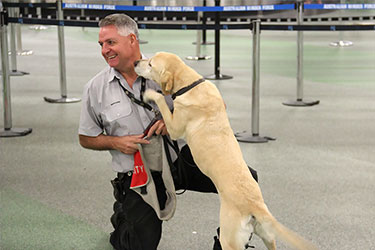
Our detector dogs are experts at sniffing out biosecurity risk items at the key entry points across Australia.
Did you know that our team of biosecurity detector dogs sniff out in excess of 65,000 biosecurity risk items at international airports, mail centres, seaports and courier depots across Australia each year?
In doing so, these dogs and their handlers are at the very forefront of Australia’s biosecurity defences, helping to protect our $60 billion a year agricultural sector.
We have released a new video to celebrate the important contribution of our detector dog program.
Head of the detector dog program Jessica Mitchell said the video explains the history of the program, as well as how detector dogs are trained to find biosecurity threats across a range of settings.
Continue reading about a close-up on our detector dogs
‘You may see our biosecurity detector dogs in action at Australia’s major international airport passenger terminals, but they also work behind the scenes in mail and cargo environments,’ Ms Mitchell said.
‘It is so important that you know what is in your bags and honestly declare anything of biosecurity concern when arriving in Australia.
‘Our dogs can detect everything from large food items down to small plant seeds,’ Ms Mitchell said.
The department’s detector dog program started as a pilot program in 1991, which has grown to now include a national team operating at major international airport passenger terminals and international mail centres.
We are constantly modernising and developing our detector dog program as an integral part of our broader biosecurity detection system.
‘Our dogs are a vital biosecurity detection tool and we need the public to understand why we use the dogs, how the dogs find items of biosecurity interest and why it is essential you are aware of what you can and can’t bring into Australia when you return from overseas,’ Ms Mitchell said.
‘We are working tirelessly to keep pests and diseases like African swine fever and brown marmorated stink bugs out of Australia and our detector dogs have a huge role to play.’
You can help us promote the amazing job our dogs do in preventing biosecurity threats from entering Australia by sharing the video with your networks.
Watch the video and meet our detector dogs.
Strong penalties underline the importance of our biosecurity laws

A Tasmanian woman has been sentenced to 11 months jail for illegally importing garlic bulbs.
In early September, the former head of the Australian Garlic Industry Association was sentenced to 11 months jail for illegally importing garlic bulbs.
Ayiana Pty Ltd director Letetia Ware pleaded guilty to importing garlic bulbs over a three year period for the purposes of commercial cultivation, without the required import permit—an action that put Australia’s horticulture industry at serious risk.
Illegally imported plant and animal material that is intentionally hidden from biosecurity checks is a potential pathway for pests and diseases to establish in Australia.
Acting Chief Plant Protection Officer Robyn Cleland said the illegal importation of garlic is especially concerning as it could carry Xylella fastidiosa—Australia’s number one plant disease risk.
‘Xylella affects more than 350 species of native, commercial and garden plants,’ Dr Cleland said.
Continue reading about strong penalties underline the importance of our biosecurity laws
‘An outbreak of Xylella could devastate agricultural production and create a catastrophic economic impact—our wine industry would stand to lose up to $8 billion over 50 years.’
Ms Ware was found guilty of breaching subsections of the Quarantine Act 1908 and Biosecurity Act 2015, for failing to comply with conditions for conditionally non-prohibited goods brought or imported into Australian territory.
Head of biosecurity enforcement and sanctions Dr Richard Chadwick said the outcome was made possible by the committed efforts of officers to enforce Australia’s strict biosecurity laws.
‘I am pleased with the efforts of our team involved in this investigation and prosecution,’ Dr Chadwick said.
‘Our reputation as a forward-looking regulatory agency is strengthened by maintaining a vigilant watch.
‘We won’t tolerate deliberate wrongdoing—tough penalties like these act as a deterrent to anyone looking to circumvent Australia’s biosecurity laws.’
You can confidentially report a biosecurity breach by calling the department’s Redline on 1800 803 006. Find out more about reporting a breach on our website.
Discovery Garden gets the biosecurity ‘all-clear’
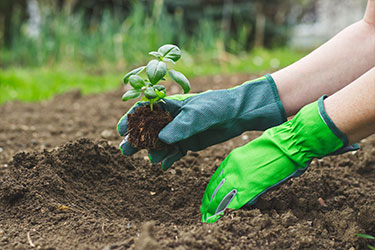
The plants and potting material given away by Woolworths all meet Australia’s strict biosecurity requirements.
Live seeds and plants, like those given away by Woolworths in their recent Discovery Garden promotion, are a wonderful way to get everyone, particularly children, involved in growing food and learning where food comes from.
Behind the scenes, there is a lot of cooperative work undertaken to ensure those seeds and plants don’t pose a biosecurity threat to our agricultural industries.
Australia’s acting Chief Plant Protection Officer Robyn Cleland explained how the department and Woolworths worked together to bring Discovery Garden to full bloom.
‘In the case of the Discovery Garden promotion, we worked closely with the supermarket to ensure that products complied with our biosecurity requirements,’ Dr Cleland said.
Continue reading about Discovery Garden gets the biosecurity ‘all-clear’
‘This was because unchecked imported plant products and seeds could accidentally bring in exotic plant diseases, pests or weeds that we want to keep out of Australia.’
Most of the seed species used in the promotion are of Australian origin and all are listed as permitted species for entry into Australia.
However, the seed mat, growing media (coconut fibre) and biodegradable pot (plant fibres) were assembled in multiple countries before importation into Australia. The department paid close attention to these materials.
‘We conducted an end-to-end assessment of the process and managed a number of critical control points to ensure phytosanitary cleanliness and biosecurity integrity were maintained,’ Dr Cleland said.
‘As a result of this close collaborative process, the public can be confident that the promotion poses no threat to our agricultural sector.
‘It’s great to see industry letting the Australian public know that their promotional material has met Department of Agriculture biosecurity requirements.
‘So anyone wanting to grow their Discovery Garden can do so safe in the knowledge that our diligent work in the background is protecting our vital and growing agricultural industry.’
Find out more about the import process.
Taking a hard-line on biosecurity breaches

Heavy penalties can apply to people who deliberately try to circumvent Australia’s strict biosecurity laws.
Biosecurity is an essential element in growing Australia’s economic well-being, helping to protect our unique environment and maintaining our distinctive way-of-life.
A major pest or disease incursion, such as African swine fever, brown marmorated stink bug or foot and mouth disease, has the potential to cost billions of dollars in outbreak response, agricultural sector impact and agricultural trade implications.
This means biosecurity is a vital activity and a shared responsibility.
The Biosecurity Act 2015 came into effect on 16 June 2016. Over the past three years the Department of Agriculture has increased efforts to deter non-compliance.
Head of biosecurity enforcement and sanctions Dr Richard Chadwick emphasised the obligations that industry has under the law.
Continue reading about taking a hard-line on biosecurity breaches
‘Industry participants should now understand their legal obligations under the Biosecurity Act 2015 and should have processes and systems in place to ensure compliance,’ Dr Chadwick said.
‘If not, and if they are found to be in breach of the Act, we may issue infringement notices and take other enforcement action.
‘If an infringement notice is issued and the amount specified in the notice is paid on time, the Department will not take further action.
‘If the amount specified in the notice is not paid, then prosecution for an offence or proceedings for a civil penalty order may be commenced—the court may then impose a higher penalty for the contravention.’
It is in the best interest of businesses, and more broadly Australia’s biosecurity, that all efforts are taken to ensure breaches do not occur in the first place.
If you have any questions about the issuing or payment of infringement notices, contact our Infringement Notice Unit or call (02) 6272 4965 from Monday to Friday, 8:30 am – 4:30 pm AEDT.
Access further information on the Infringement Notice Scheme.
New video ramps up campaign against hitchhiker pests
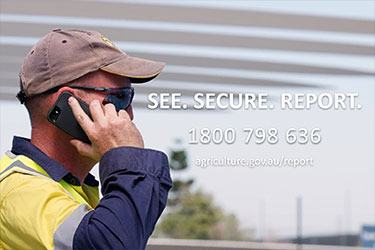
Our SEE.SECURE.REPORT videos show how simple it can be to help prevent a biosecurity threat.
Are you an approved arrangement holder or do you work on an approved arrangement site? It is your legal responsibility to ensure you are ready to detect and respond to a possible biosecurity risk.
We have developed a new SEE.SECURE.REPORT video to raise awareness of pests and diseases that may be present at cargo terminals.
Head of compliance controls Dean Merrilees said the video served as a timely reminder that a variety of pests can hitchhike their way into Australia on imported goods, shipping containers and machinery.
‘We want to emphasise the importance of the simple things workers can do on-site to stop a pest escaping and establishing itself in the environment,’ Mr Merrilees said.
Continue reading about new video ramps up campaign against hitchhiker pests
‘This includes securing goods and closing the door, not moving cargo and reporting suspected risks to us as soon as possible.’
This is the second SEE.SECURE.REPORT video we have produced this year following the hitchhiker pest video in February. The first video was incorporated into training materials for several of our industry partners as a great visual resource.
‘With the brown marmorated stink bug risk season now upon us, I encourage you to spread the word to ensure everyone in the port environment understands their biosecurity obligations,’ Mr Merrilees said.
‘If you see something, report it by phoning us immediately on 1800 798 636 or visiting our website.’
Both videos are available on our website or you can access them on YouTube.
Seasonal measures for brown marmorated stink bug in full swing
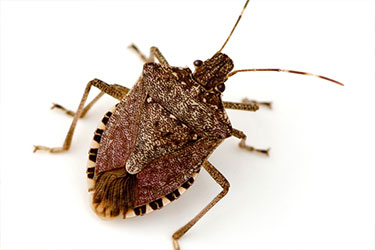
Brown marmorated stink bug could devastate our agriculture, so it’s vital to be aware of the risk and SEE.SECURE.REPORT.
Our seasonal measures for brown marmorated stink bug (BMSB) are now in effect for the 2019–20 risk season.
We have strengthened the seasonal measures further this year in response to the rapid expansion of BMSB through Europe and North America.
Heightened biosecurity measures apply to certain goods manufactured in, or shipped from, target risk countries. The list of countries has increased from 10 to 33 this year.
Head of compliance controls Dean Merrilees said the department is keen to work with industry to keep this damaging pest out of Australia.
‘Stopping BMSB is a joint effort between industry and government so it’s important that you are aware of the seasonal measures and what they mean for your work,’ Mr Merrilees said.
Continue reading about seasonal measures for brown marmorated stink bug in full swing
‘We conducted a range of awareness sessions in the lead up to the season and we want to continue the conversation throughout the BMSB risk season.
‘Head to our website at agriculture.gov.au/BMSB for up-to-date information about inspections, target risk goods, and treatment requirements and options.’
Head of compliance Peta Lane said it was important for anyone working at the border to look out for suspicious pests.
‘Biosecurity is everyone’s responsibility and that means being aware of pests that may attempt to hitchhike into Australia,’ Ms Lane said.
‘You can identify a BMSB by the distinctive brown shield shaped body with black and white banding around the outer edge of the abdomen.
‘BMSB will stow away inside shipping containers, in goods and packaging, as well as break bulk cargo such as vehicles and machinery.
‘We want everyone who comes into contact with a pest to SEE.SECURE.REPORT.’
To report something unusual, call 1800 798 636 or head to our website.
Arming Australia with knowledge about priority pests and diseases

White nose disease, affecting bats, could cause devastation amongst Australia’s endangered bats. It’s one of more than 40 threatening pests and diseases on the National Priority List. Photo credit: University of Illinois/Steve Taylor
More than 40 pests and diseases that could threaten Australia’s wildlife, environment and social amenity are the target of the National Priority List of Exotic Environmental Pests and Diseases, a project that draws upon the expertise of governments, research agencies, universities and other organisations across Australia.
The Australian Bureau of Agricultural and Resource Economics and Sciences (ABARES) and other key areas in the Department of Agriculture led the development of the list.
The experts who developed the list decided which species would pose the biggest risk to flora and fauna and the unique ecosystems of our continent—not to mention the ability of Australians to enjoy our beautiful environment into the future.
Australia’s Chief Environmental Biosecurity Officer (CEBO) Ian Thompson detailed the broad range of threats that the list encompasses.
‘The list includes pest species on land and in water, diseases that affect our native animals and plants, as well as weeds, algae and more,’ Mr Thompson said.
Continue reading about arming Australia with knowledge about priority pests and diseases
‘These threat species have the potential to not only actively harm our native species, but to also out-compete native populations, overrun fragile habitats and damage our social spaces and assets.
‘We need to know everything we can about them, and be prepared to stop them getting a foothold in our environment.’
The list is a key outcome of the 2017 independent review of the capacity of the national biosecurity system and its underpinning intergovernmental agreement, the Intergovernmental Agreement on Biosecurity.
It will help Australia prepare for and deal with environmental biosecurity threats of the future.
While the final list will be endorsed and published in early 2020, the CEBO has released an interim list for use in consulting stakeholders and the public.
‘The feedback we collected on the interim list will help ensure we derive maximum value from the list as a robust information tool for anyone who has a stake in our unique environment. The feedback will also contribute to informing future reviews of the list,’ Mr Thompson said.
‘The final list will be released in early 2020. It will arm government, industry and communities with the knowledge they need to improve surveillance and detection activities, and to bolster their preparedness and response plans.’
You can find out much more about the list and how it is being developed on our website.
New mandatory import permits for cut flowers and foliage
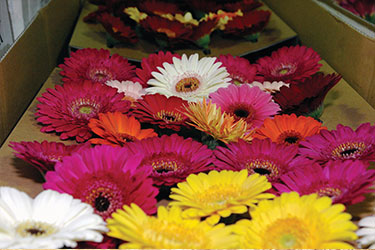
Import permits are now mandatory for cut flowers and foliage imports from certain countries. Know your obligations if importing.
Countries which export fresh cut flowers and foliage to Australia must follow our biosecurity laws to ensure that pest insects do not enter our country and begin damaging our flora industry and environment.
Since Australia’s import conditions for fresh cut flowers and foliage changed in March 2018, the department has encouraged exporting countries to work towards reducing their non-compliance rate to a low level.
However, some countries have not managed to achieve a sufficiently low level. To address the issue, we have introduced import permits for exports of fresh cut flowers and foliage to Australia from those countries with very high levels of non-compliance using a systems production approach, and with high trade volumes.
Under this arrangement, import permits became mandatory for all cut flowers and foliage imports from Kenya, Colombia and Ecuador produced using a systems approach on 1 September 2019.
Continue reading about new mandatory import permits for cut flowers and foliage
Acting head of plant import operations Anthony Wicks explained that anyone who wishes to import flowers and foliage produced using a systems approach from Kenya, Colombia and Ecuador must apply to the department for a permit.
‘Initial permits issued by the department have a four-month validity period,’ Mr Wicks said.
‘When an importer applies for another permit we will assess their effectiveness at preventing the arrival of live insect pests of biosecurity concern, under the initial permit.
‘Depending on the outcome of this assessment, we may refuse to grant another permit or require the importer’s supply chain control measures to be modified to better manage the biosecurity risks.
‘An import permit is not required to import from these countries if the cut flowers or foliage has undergone pre-export methyl bromide fumigation, or an alternative treatment that has been approved by the exporting country’s National Plant Protection Organisation.
‘A permit is also not currently needed to import cut flowers and foliage from other countries.’
More information on applying for an import permit is available on our website.
‘Our work continues on assessing the potential biosecurity risks involved with importing fresh cut flowers and foliage,’ Mr Wicks said.
‘We will release the second part of the Pest Risk Analysis for Cut Flower and Foliage Imports for public consultation in late 2019. The first part was finalised in June, and considered thrips, mites and aphids. Part 2 will look at other arthropod pests that were not assessed in Part 1.’
To keep track of the progress of the risk analysis and receive updates visit our cut flowers and foliage risk analysis page, or contact the Plant Stakeholders inbox.
Biosecurity operations group profile: leaders in assurance for agriculture, across biosecurity and trade

The Audit and Assurance Group conducts over 8,000 audits annually, supporting Australia’s biosecurity strength and market access status.
Our operational capability is supported by seven specialist groups, each overseeing a critical aspect of biosecurity. In a new feature, we will be profiling one of these groups in each edition of Biosecurity Matters, into 2020.
The Audit and Assurance Group (AAG) leads regulatory audits and assurance across biosecurity and export activities.
Head of AAG Peter Cook said their auditors conduct over 8,000 audits annually of import and export approved arrangements, export registered establishments and authorised officers, vessels, plant export accredited properties, treatment providers and live animal export premises.
‘Our auditors conduct regulatory audits to assess compliance with departmental requirements, relevant legislation, International and Australian Standards and importing country requirements,’ Mr Cook said.
Continue reading about biosecurity operations group profile: leaders in assurance for agriculture, across biosecurity and trade
‘Audits provide a form of assurance that the identified risks in the import and export continuum are being managed.’
AAG auditors are skilled in accordance with the AAG Auditor Management Framework and hold formal Lead Food Safety Auditor qualifications.
They also complete internal training, assessment and competency verification processes to obtain and maintain the specific competencies required to audit on behalf of the department.
‘We are proud of the level of professionalism that our auditors display—their diverse experience and backgrounds enhance the breadth of the regulatory assurance we can provide,’ Mr Cook said.
‘We have been working hard over the past few years to streamline the audit process and provide an improved experience for entities that operate across both imports and exports.
‘These entities traditionally receive separate audits for their import and export business.
‘Working with our Biosecurity 2025 team, AAG has successfully completed a pilot of multi-activity audits across our Freight Forwarder industry group.
‘Members of this group operate across 3 different pieces of legislation, with policy provided by numerous areas in the department.
‘The pilot successfully demonstrated that the various departmental requirements can be harmonised and that one audit can be conducted to cover all requirements—we are now looking at ways we can apply this approach in other sectors.‘
Make sure you are subscribed to Biosecurity Matters to find out more about our specialist groups in the next edition.
Rat kebabs and other surprises

A single abandoned bag contained a plethora of biosecurity risk items at Perth Airport.
Biosecurity officers at Perth Airport recently uncovered a haul of biosecurity risks after X-raying an abandoned bag that had made its way here from South Africa.
The bag contained rats skewered on wooden sticks, dried unidentified plant material with insects, live plant material, kola nuts, rawhide fans, and other suspect material wrapped in paper.
Any one of these items would raise red flags—a bag stuffed to the brim with them is a biosecurity disaster waiting to happen.
The plant material alone presents a clear danger to our delicate ecosystem. Soil, insects and pathogens have the potential to cause serious damage to our native flora and fauna. Panama Disease Tropical Race 4, Xylella, and citrus canker are plant diseases that all have the capacity to change the landscape of Australian horticulture and agriculture.
Animal products, like rawhide and fur, must be properly tanned and treated before entering Australia. Another important reason why we impose strict conditions for these products is to ensure they aren’t from an endangered species.
The items were all destroyed.
Before bringing goods to Australia, check that they are allowed.
Plants in the post can bring unwelcome passengers
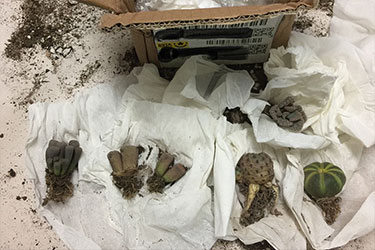
A parcel sent from Hong Kong contained dozens of illegally imported living plants.
Australia has strict laws about sending plant material from overseas, but this doesn’t stop those who try to circumvent import restrictions by marking their parcels as something innocuous. That’s where our biosecurity officers come in.
A parcel sent recently from Hong Kong, marked as containing ‘packing bags’, turned out to contain something rather different: 65 live succulent plants growing in soil.
Both soil and plants sent through the mail could courier exotic plant diseases, insects and snails onto our shores. Needless to say, the plants did not reach their intended destination.
Another package sent this year from Thailand contained raw cashew seed pods and live plant cuttings, which were infested with insects. The goods did not meet import requirements, so the parcel was swiftly destroyed.
It is possible to legally import plant material to Australia but there are strict conditions that must be followed in order to bring them into Australia.
If you want to send any kind of plant material to Australia check the relevant import conditions using our Biosecurity Import Conditions system (BICON).
Nominations for 2020 Australian Biosecurity Awards are now open
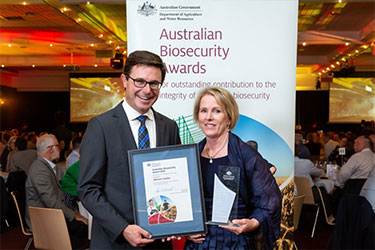
The former Minister for Agriculture and Water Resources David Littleproud (left) and winner of the 2019 Farm Biosecurity Producer of the Year award, cattle producer Melinee Leather (right).
Nominations for the 2020 awards—which recognise individuals, groups and organisations who have supported and promoted Australia’s biosecurity system—are currently open and run until 6 December 2019.
Vacancies for biosecurity officers in Queensland
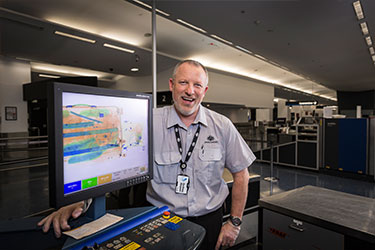
Join our biosecurity team.
We are looking for people in Queensland who care about keeping Australia free of damaging pests and diseases.
Enjoy working as a biosecurity officer and help safeguard Australia’s natural resources.
You’ll enjoy rewarding work that offers a real sense of responsibility. And you’ll have the opportunity to make a difference every day.
We want your input

The department is seeking feedback on:
You can also learn about exciting developments in the biosecurity space through The Seed, our biosecurity innovation hub.
See the latest Import industry advice notices or Export industry and market access notices.
